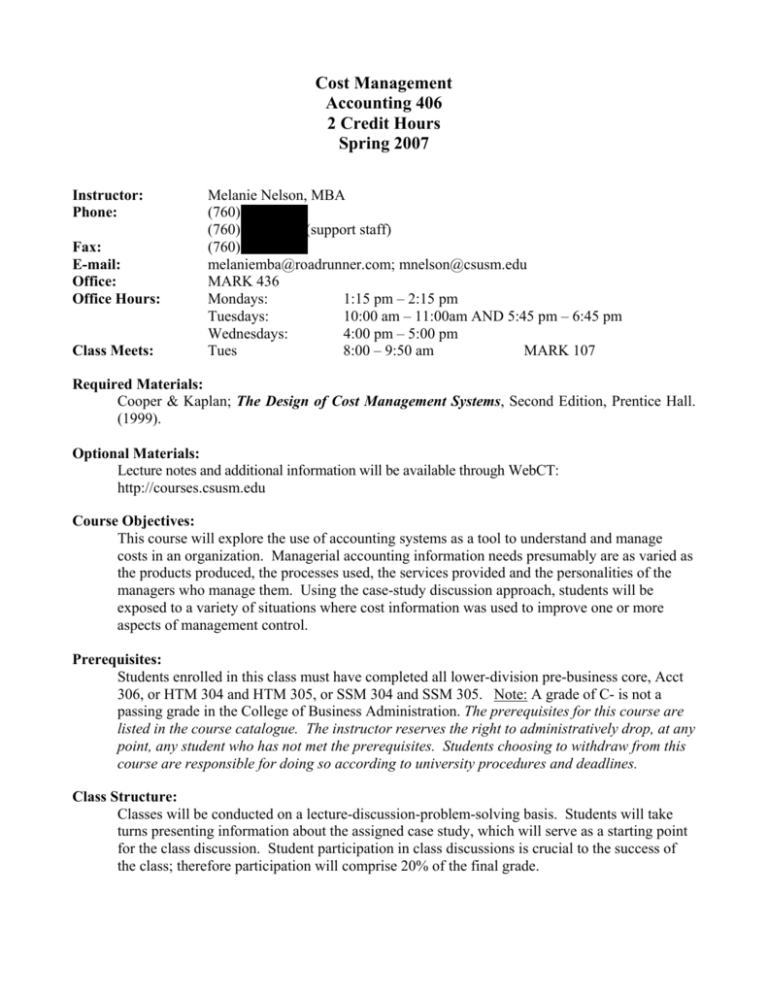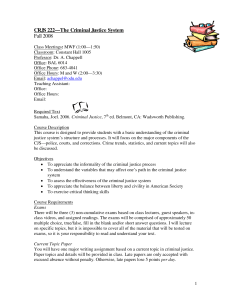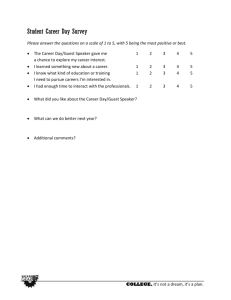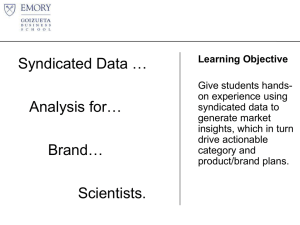Cost Management Accounting 406 2 Credit Hours Spring 2007
advertisement

Cost Management Accounting 406 2 Credit Hours Spring 2007 Instructor: Phone: Fax: E-mail: Office: Office Hours: Class Meets: Melanie Nelson, MBA (760) 723-1806 (760) 750-4264 (support staff) (760) 723-2720 melaniemba@roadrunner.com; mnelson@csusm.edu MARK 436 Mondays: 1:15 pm – 2:15 pm Tuesdays: 10:00 am – 11:00am AND 5:45 pm – 6:45 pm Wednesdays: 4:00 pm – 5:00 pm Tues 8:00 – 9:50 am MARK 107 Required Materials: Cooper & Kaplan; The Design of Cost Management Systems, Second Edition, Prentice Hall. (1999). Optional Materials: Lecture notes and additional information will be available through WebCT: http://courses.csusm.edu Course Objectives: This course will explore the use of accounting systems as a tool to understand and manage costs in an organization. Managerial accounting information needs presumably are as varied as the products produced, the processes used, the services provided and the personalities of the managers who manage them. Using the case-study discussion approach, students will be exposed to a variety of situations where cost information was used to improve one or more aspects of management control. Prerequisites: Students enrolled in this class must have completed all lower-division pre-business core, Acct 306, or HTM 304 and HTM 305, or SSM 304 and SSM 305. Note: A grade of C- is not a passing grade in the College of Business Administration. The prerequisites for this course are listed in the course catalogue. The instructor reserves the right to administratively drop, at any point, any student who has not met the prerequisites. Students choosing to withdraw from this course are responsible for doing so according to university procedures and deadlines. Class Structure: Classes will be conducted on a lecture-discussion-problem-solving basis. Students will take turns presenting information about the assigned case study, which will serve as a starting point for the class discussion. Student participation in class discussions is crucial to the success of the class; therefore participation will comprise 20% of the final grade. Homework: Homework assignments will include discussion questions and problems relating to one or more of the case studies from the assigned chapter. Homework will be checked for completeness. Late homework will be accepted for a reduced grade. In addition, each chapter will require a one-page deliverable in “presentation format”. Written aids and oral presentations are important communication skills in management. The presentation format assignments in this course will increase your ability to get your ideas across to others and provide a useful starting point to class discussion of the reading materials. Students should plan to present their presentation slides to the class at least three times during the semester. Exams: There will two equally weighted exams: one midterm and a final. Exams will be problem and essay format. Lined writing paper will be provided for essays. You may use any resources you wish (textbooks, lecture notes, etc.) except for a consultant. Makeup exams will be permitted in extenuating circumstances provided the student contacts the instructor prior to the start of the exam. The exam MUST be made up before the next class meeting. Writing Requirement: The University writing requirement will be fulfilled through the written homework assignments, essay exam questions, guest speaker write-ups, and the presentation format assignments. Guest Speakers: At least two guest speakers will address the class during the semester. Please come prepared to ask at least one question. Please note that attendance, participation and write-up of the guest speaker sessions will comprise 10% of the final grade. Be aware that due to the busy schedules of our guest speakers, the schedule may require last minute changes. Grading: The course grade will be weighted as follows: Homework Presentation Format Assignments Guest Speaker attendance & write-up Class Participation Exams Total 10% 20% 10% 20% 40% 100% Grades will be assigned based on the normal curve, as illustrated on the next page. Homework quality will be the deciding factor in borderline cases. In the event that the percentage grade exceeds the curved grade, students will be assigned the percentage grade. Mean One Standard Deviation Below Mean C’s B’s One Standard Deviation Above Mean D’s and F’s -1 A’s 0 Percent Grade 90 - 100 80 - 89 70 - 79 60 - 69 0 - 59 A B C D F 1 Academic Integrity: In order to fairly evaluate each student’s performance in this class, it is imperative that all work submitted be your own. Therefore the following will be strictly enforced: 1) 2) 3) There will be no talking allowed during quizzes or exams. If you finish your quiz early, please sit quietly (bring reading material if necessary.) Any suspicious quizzes or exams will be assigned a grade of zero. BEWARE: Either giving or receiving help during quizzes and exams is dishonest. In other words, if you allow someone to copy your work, you are just as guilty of cheating as the other party. If you have studied hard for an exam or quiz, don’t risk it! Cover your work. Plagiarism will not be tolerated. All direct quotes must be noted as such. Any ideas, claims or opinions that are not your own must also be cited. For example, to state that “AAA Inc. leads the way in the widget industry,” would require either citing the data that led you to form that opinion, or the source document that made the claim. Exceptions: Since homework is only graded for completeness, I do allow students to work together. However, each student must submit his or her own work to receive credit. Please let me know if you have a study partner or group. You may also find it useful to have another student review your term paper before submitting it. This is acceptable, and even desirable, as someone else will be able to spot errors you might have missed. However, the work you submit must be your own. How to Get the Most Out of This Course 1. Do not miss class. We will be covering a lot of material in each session. It is critically important to stay current on assignments. 2. Experiment with and grow your presentation capabilities. Although it may seem threatening to present in class, your presentations on the job are actually much more important to your careers. 3. Participate in class discussion. It is more interesting for all concerned to have class interaction. Bring your experiences and learn from others’. Accounting 406 - Tentative Schedule Date Assigned Reading Lecture Topic 23-Jan Course Introduction 30-Jan Cost and Performance Management Systems Ch1 6-Feb Traditional Stage II Cost Systems Ch2 13-Feb Stage III Systems for Learning and Improvement Ch3 20-Feb Activity-Based Costing: Introduction Ch4 27-Feb Measuring the Cost of Resource Capacity Ch5 6-Mar Midterm Exam -- 13-Mar Guest Speaker -- 20-Mar Operational and Strategic Activity-Based Management in Manufacuring Companies Ch6 27-Mar Spring Break - No Class Meeting 3-Apr Strategic Activity-Based Management for Customer and Suppliers 10-Apr Guest Speaker 17-Apr Strategic Activity-Based Management: Product Development Ch8 24-Apr Applying ABC to Service Industries Ch9 1-May Stage IV: Integrated Cost Systems Ch10 8-May Stage IV: Using ABC for Budgeting and Transfer Pricing Ch11 15-May Tues., May 15 7:00 am Ch7 Acct 406 Homework Schedule Chapter Case Study Problems/Discussion Questions 1 Bridgeton Industries 1) Calculate the OH allocation rate based on Direct Labor dollars for model years 1987-1990. Are the changes significant? Why have they occurred? 2) Consider two products in the same product line: #1 #2 Expected selling price $62 $54 Std. material cost 16 27 Std. labor cost 6 3 Presentation Format Describe an accounting system with which you are familiar and classify it as I, II, III or IV. Give reasons for your classification. Calculate the expected gross margins as a percentage of selling price on each product based on 1988 and 1990 model year budgets, assuming price, material and labor cost do not change from standard. 3) Assuming that selling prices, volumes, and material costs for the 1991 model year will not change for fuel tanks, doors, and manifolds, prepare an estimated model year budget for ACF for 1991 (a) if no additional products are dropped and (b) if the manifold product line is dropped. 4) Would you outsource manifolds form ACF in 1991? Why or why not? What more information would you want before reaching a final decision? 2 Seligram, Inc – Electronic Testing Operations 1) What caused the existing system at ETO to fail? 2) Calculated the reported costs of the five components described in a. The existing system b. The system proposed by the accounting manager c. The system proposed by the consultant 3) Which system is preferable? Why? 4) Would you recommend any changes to the system you prefer? Why? 5) Would you treat the new machine as a separate cost center or as part of the main test room? Describe how inaccurate and misleading cost information can negatively impact cost management 3 4 Texas Eastman Company 1) Describe the Quality Management program initiated ad Texas Eastman. What role did the new information systems play in the quality program? 2) Identify the strengths and weaknesses in the existing financial reporting system. What was the value of the period Departmental Cost Sheets (see exhibit 8) in the information-rich operating environment of Texas Eastman? 3) How have the operators in Briley’s 3B Cracking Plant been using the new Daily Income Report? Why is this report useful to them? 4) What were the information requirements for the new report? Which factors change daily, and which data stay the same from day-to-day? Why? 5) What should Pat Kinsey, the chief accountant, do next? How should the reporting environment in the Texas Eastman plant be modified in light of the experience in thee 3B Cracking Plant? What role should be played by the central accounting and finance group? Read The Classic Pen Company and complete the requirements at the end of the case Read Western Dialysis Clinic and complete the requirements at the end of the case Describe how a “Pseudo Profit Center” affects cost management How does Siemens new cost system support the strategy of the firm in ways that the traditional system cannot? Read Siemens Electric Motor Works (A) 1) Calculate the cost of the five orders in Exhibit 4 under the traditional and new systems. 2) Calculate traditional and new system costs for each order if 1 unit, 10 units, 20 units or 100 units are ordered. Graph the product costs against volume ordered 5 Lehigh Steel 1) Compute profits for the five sample products under ABC and TOC 2) Identify the differences in assumptions between Standard Costing, ABC and TOC 3) Identify a fourth method of calculating profits that corrects assumptions identified above that are inappropriate to Lehigh’s business situation 4) Based on profit calculations and other business considerations, make recommendations for Lehigh’s product mix in 1993 How does Capacity impact cost analysis and cost system design?








